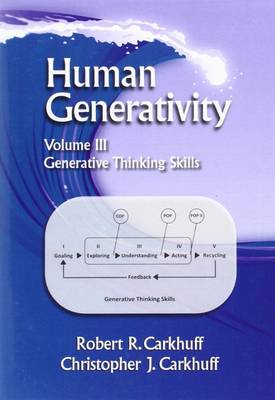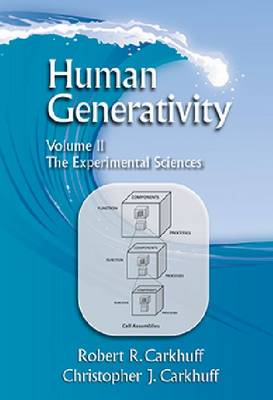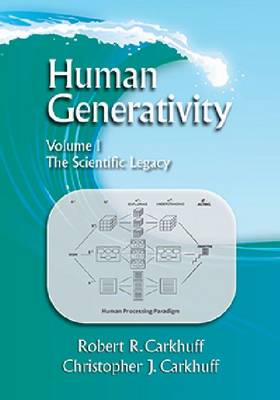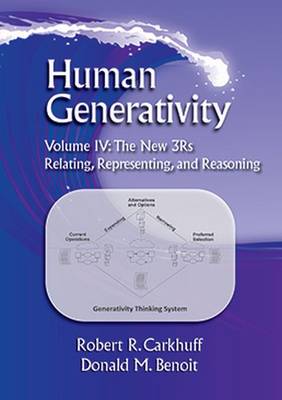Human Generativity
4 total works
Generative Thinking Skills
by Robert R. Carkhuff and Christopher J. Carkhuff
Published 30 March 2014
Generative thinking - the ability to transform the raw data of human experience into productive information - allows us to process any experience in life into principles, programmes and objectives. That means we are never without recourse in resolving problems or achieving goals.
Human Generativity: Generative Thinking Skills is an introduction to these empowering generative thinking skills.
The book is organised into 6 parts to give readers a thorough grounding in how to prepare for, explore, understand, act and recycle generative thinking skills. Key topics include:
Human Generativity: Generative Thinking Skills is the third volume in a series of three. In volume one, the authors explore the scientific legacy of generative thinking. In volume two, they introduce the reader to the experimental sciences.
Human Generativity: Generative Thinking Skills is an introduction to these empowering generative thinking skills.
The book is organised into 6 parts to give readers a thorough grounding in how to prepare for, explore, understand, act and recycle generative thinking skills. Key topics include:
- How to prepare by identifying performance, benefits and productivity goals
- How to explore the experience by analysing feedback, outputs, processes, inputs and systems
- How to understand and synthesise goals by expanding and narrowing systems and operations
- How to act by defining objectives, and developing, formulating and evaluating programmes
- How to recycle by feedbacking information for more extensive exploring, more accurate understanding and more productive acting.
Human Generativity: Generative Thinking Skills is the third volume in a series of three. In volume one, the authors explore the scientific legacy of generative thinking. In volume two, they introduce the reader to the experimental sciences.
Generative processing is the source from which all breakthrough science are generated and all technologies are innovated. It is also the most difficult human experience to articulate. Human Generativity Systems: The Experimental Sciences is dedicated to exploring the role of the experimental sciences in the advancement of human generativity. The book brings together the most stimulating ideas and most informed insights into generativity systems, cellular information and models.
After introducing the idea of generativity systems in Part I, they examine in Part II the five phases of inductive generativity processes and the five phases of deductive generativity processes, offering case studies to illustrate key points.
Part III focuses on generating cellular information with discussions of generating information cells, as well as optimising cell assemblies where generativity processing really begins. Also examined is how we may advance our learning by acting upon phase sequences of cells.
Part IV looks at inductive, deductive and paradigmetric generativity models. Finally, in Part V, the book offers insights into the experimental sciences and the transition toward human generativity.
Human Generativity: The Experimental Sciences is the second volume in a series of three. In volume one, the authors explore the scientific legacy of generative thinking. In volume three, they introduce the reader to generative thinking skills.
After introducing the idea of generativity systems in Part I, they examine in Part II the five phases of inductive generativity processes and the five phases of deductive generativity processes, offering case studies to illustrate key points.
Part III focuses on generating cellular information with discussions of generating information cells, as well as optimising cell assemblies where generativity processing really begins. Also examined is how we may advance our learning by acting upon phase sequences of cells.
Part IV looks at inductive, deductive and paradigmetric generativity models. Finally, in Part V, the book offers insights into the experimental sciences and the transition toward human generativity.
Human Generativity: The Experimental Sciences is the second volume in a series of three. In volume one, the authors explore the scientific legacy of generative thinking. In volume three, they introduce the reader to generative thinking skills.
Robert Carkhuff boldly confronts our current socioeconomic crises: “Generativity is the solution. What is the question?” Human Generativity: The Scientific Legacy sets out to answer that question.
The authors focus on the five systems of human processing:
In part I, you’ll go on a Voyage of Discovery into the unknown space of human processing or generativity. Simply put, it is the generation of new ideas. In part II, you’ll explore relating as the foundation of the human experience, representing as the foundation of Information Sciences and reasoning as the foundation of Human Sciences. In part three, the authors discuss reorganising as the continuous realignment of resources and repositioning as the continuous representation to the market and how they relate to realising human and information potential.
Human Generativity: The Scientific Legacy is the first volume in a series of three. In volume two, the authors focus on the experimental sciences. In volume three, they introduce the reader to generative thinking skills.
The authors focus on the five systems of human processing:
- Relating which captures our human experience
- Representing which captures our images of these experiences
- Reasoning which culminates processing our images to action
- Reorganising which aligns our human and information resources to succeed
- Repositioning which reorients our organisations to accomplish our purposes or missions
In part I, you’ll go on a Voyage of Discovery into the unknown space of human processing or generativity. Simply put, it is the generation of new ideas. In part II, you’ll explore relating as the foundation of the human experience, representing as the foundation of Information Sciences and reasoning as the foundation of Human Sciences. In part three, the authors discuss reorganising as the continuous realignment of resources and repositioning as the continuous representation to the market and how they relate to realising human and information potential.
Human Generativity: The Scientific Legacy is the first volume in a series of three. In volume two, the authors focus on the experimental sciences. In volume three, they introduce the reader to generative thinking skills.
The New 3Rs: Relating, Representing, and Reasoning is a book about thinking skills and freedom. It is written for students, employees, managers, executives - anyone who wants to become a more creative, innovative, generative and skilled thinker and make important contributions during their lifetime.
The underlying idea of this book is this: If you tend to follow others and don’t direct your energies to generating your own ideas, then you are missing opportunities to use your freedom. To actualise your freedom, you need to think creatively and innovatively, and this book shows you how.
You’ll learn how relating skills empower communication and how representing skills enable you to organize complex information. You’ll also understand how reasoning skills help you set goals, analyse problems and opportunities, expand to generate new ideas and options, make decisions, lead projects and evaluate performance.
In six chapters, the authors:
The underlying idea of this book is this: If you tend to follow others and don’t direct your energies to generating your own ideas, then you are missing opportunities to use your freedom. To actualise your freedom, you need to think creatively and innovatively, and this book shows you how.
You’ll learn how relating skills empower communication and how representing skills enable you to organize complex information. You’ll also understand how reasoning skills help you set goals, analyse problems and opportunities, expand to generate new ideas and options, make decisions, lead projects and evaluate performance.
In six chapters, the authors:
- Build a systems view of individual freedom
- Introduce critical skills for thinking and individual freedom - relating, representing and reasoning.
- Present the skills of relating to information and the people who produce it and explain the behavioural steps involved in getting, giving and merging with people and other sources of information.
- Explain three useful ways for representing information and introduce cognitive structures for building sentences, systems and schematic models
- Guide you through a reasoning process for creating information and introduce systematic methods for exploring, understanding and acting upon information to generate new and better information
- Challenge you to unleash your thinking, enable your freedom and empower a generation of free people - The Possibilities People.



